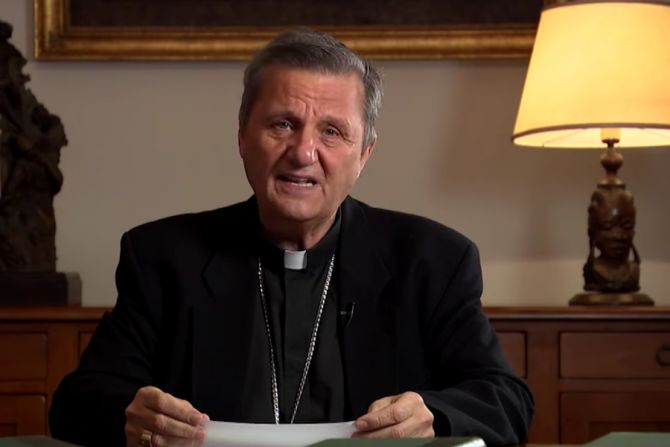Cardinal Mario Grech sent a video message to the U.S. bishops Thursday, urging them to be frank in sharing with the Vatican what they hear from people in their dioceses during local synodal processes.
“Do not be afraid to tell us frankly what you have gathered from listening to your people about what the Spirit is saying to the Church: to your Church and to the whole Church,” Grech said in the message published Nov. 18.
The General Secretary of the Synod of Bishops recorded a 14-minute video for the U.S. bishops’ fall plenary assembly in which he explained how “synodality is a way of being Church.”
The cardinal said that he wanted to define key aspects of synodality before the bishops began their discussion of the synodal process in the United States.
A synod is a meeting of bishops gathered to discuss a topic of theological or pastoral significance, in order to prepare a document of advice or counsel to the pope.
The Synod on Synodality, initiated by Pope Francis in October 2021, is a two-year, worldwide undertaking during which Catholics are encouraged to submit feedback to their local dioceses.
“Contrary to what many assume, there are no written conclusions; there is no desire to impose a line of thinking. There is a willingness to listen to the Spirit in listening to one another,” Grech said in his video message.
“Nor do we think that there are positions that are worth more than others. The will of the Secretariat [of the Synod of Bishops] is to encourage listening at all levels of the life of the Church and to itself engage in this process of listening in order to discover the voice of the Living God.”
The U.S. bishops are scheduled to address the Synod on Synodality during their fall general assembly in Baltimore, which ends on Nov. 18.
Archbishop Christophe Pierre, the apostolic nuncio to the United States, discussed synodality in his address at the assembly on Nov. 16.
“I believe that synodality is an answer to the challenges of our time and to the confrontation, which is threatening to divide this country, and which also has its echoes in the Church,” Pierre said.
Grech explained that the Church is “constitutively synodal,” while also always remaining “constitutively hierarchical.”
The synod’s chief organizer underlined that the “entire synodal process depends on the bishop,” from how it is initiated at the diocesan level to the final contributions submitted.
These included rethinking relations between the laity and ordained ministries, seeking God’s will above one’s own, making a continuous effort to invite everyone to participate, listening with charity, a willingness to give up strongly held positions in favor of collective decision-making, recognizing the way that the Church has caused wounds, and asking what kind of Church to present to the contemporary world today.
Pope Francis opened the diocesan phase of the Synod on Synodality in October for a 10-month consultation process that will last until all bishops’ conferences worldwide submit summaries of their consultations on Aug. 15, 2022.
A second, continental phase will take place from September 2022 to March 2023 ahead of the XVI Ordinary General Assembly of the Synod of Bishops to be held at the Vatican in October 2023.
“The consultation of the People of God and the discernment of the pastors takes place in the Churches, and it is from listening to the Churches that the Instrumentum laboris [working document] will be written and delivered to the members of the Synod Assembly in October 2023,” Grech said.
The Maltese cardinal added: “This Synod is a spiritual journey, an event inspired and guided by the Spirit.”
“The various testimonies we have received, the creativity with which the episcopal conferences, dioceses, parishes or associations are organizing the consultation of the People of God, are signs confirming that the Spirit is at work.”

